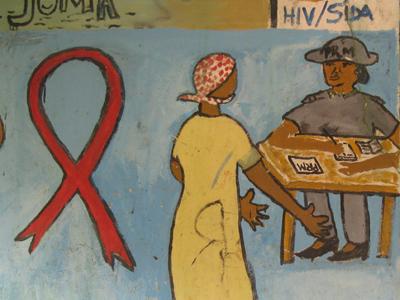Book traces history of AIDS back to 1930s, examines current outbreak’s history
An AIDS awareness painting in Mozambique, Africa. (Photo by Flickr user tonrulkens, cc-by-sa)
Story by The Takeaway. Listen to audio above for full report.
The AIDS epidemic burst onto the scene in America in the 1970s, but a new book out recently tries to look at the early history of AIDS, and its findings might be surprising.
In “The Origins of AIDS,” Dr. Jacques Pépin traces the movements of the disease that led to the current global pandemic, but also looks at what are very likely the earliest AIDS outbreaks, dating back to the 1920s and 1930s.
Donald G. McNeil, Jr., science reporter for The New York Times, reviewed the book this week.
“A lot of what is great about this book is the way it synthesizes thousands and thousands of papers written about AIDS,” McNeil said.
In the book, Pépin shows what he believe is the initial path of the HIV virus from monkeys to humans who were hunting in the African wilderness. According to Pépin the disease actually moved to humans four times, but it was only one set, Group M, that has led to the global pandemic.
One or two of those hunters then, most likely, made their way to what are now the neighboring cities of Kinshasa and Brazzaville in central Africa. They likely became involved with prostitutes and the disease was off.
Interestingly, the virus in Haiti, the United States and western Europe is from a particular subsection of the Group M virus, meaning that it can most likely be traced back to a single person traveling from Africa to haiti.
“One Hatian carried the disease in the early 1960s from Zaire to Haiti, where it was amplified probably through a plasma center there,” McNeil said.
But, dating back even farther, Pépin discovered records from the colonial era that led him to believe the AIDS virus may have been circulating as far back as the 1920 and 1930s. In records of a doctor who treated men working on building the railroad through that part of Africa, Pépin discovered stories of a sickness that killed as many as half of the men building the railroad.
The symptoms sound very much like AIDS, but without blood samples from that era, it can’t be confirmed.
In a strange twist, Pépin says he believes he probably contributed to the early spread of the disease. As a doctor in French-speak west Africa, he was part of a concerted effort to eradicate sleeping sickness. Though needles were boiled, they weren’t completely sterilized. Some people most likely contracted AIDS from this process.
———————————————-
“The Takeaway” is a national morning news program, delivering the news and analysis you need to catch up, start your day, and prepare for what’s ahead. The show is a co-production of WNYC and PRI, in editorial collaboration with the BBC, The New York Times Radio, and WGBH.
